SPECIFICATIONS
Torque Specifications
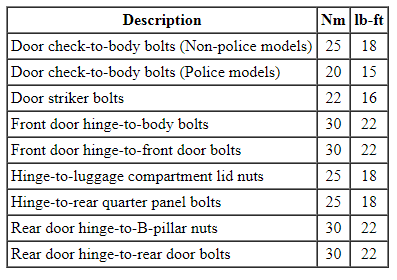
GENERAL PROCEDURES
Door Adjustment - Front
- Loosen the front door hinge-to-front door bolts until the front door is able to move slightly.
- Align the front door.
- Align the front door body angles to the rear door.
- Be sure that the front door is flush to the body.
- Tighten the front door hinge-to-front door bolts.
- Tighten to 30 Nm (22 lb-ft).
- Loosen the front door striker bolts until the striker is able to move slightly.
- Align the front door striker to the front door.
- Tighten the striker bolts.
- Tighten to 22 Nm (16 lb-ft).
Door Adjustment - Rear
- Loosen the rear door hinge-to-rear door bolts until the rear door is able to move slightly.
- Align the rear door.
- Align the rear door body angles to the rear quarter panel.
- Be sure that the rear door is flush to the body.
- Tighten the rear door hinge-to-rear door bolts.
- Tighten to 30 Nm (22 lb-ft).
- Loosen the rear door striker bolts until the striker is able to move slightly.
- Align the rear door striker to the rear door.
- Tighten the striker bolts.
- Tighten to 22 Nm (16 lb-ft).
- Adjust the front door. For additional information, refer to Door Adjustment - Front in this section.
REMOVAL AND INSTALLATION
Door
NOTE: Front door shown, rear door similar.
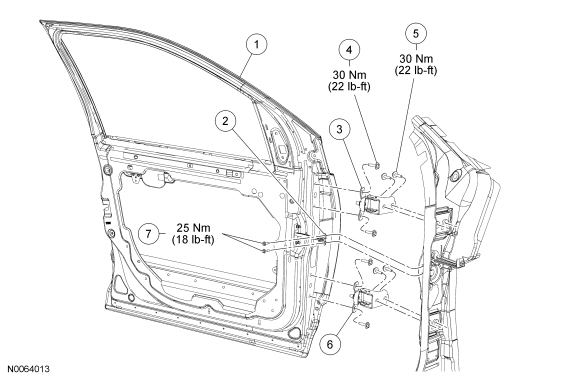
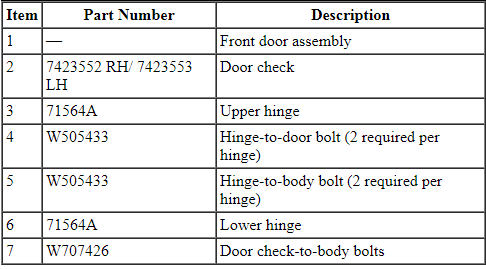
Removal and Installation
- Disconnect the front door electrical connector at the A-pillar.
- NOTE: On police vehicles an extra strap will be present.
Remove the door check bolts.
- To install, tighten to 25 Nm (18 lb-ft). (Non-police models)
- To install, tighten to 20 Nm (15 lb-ft). (Police models)
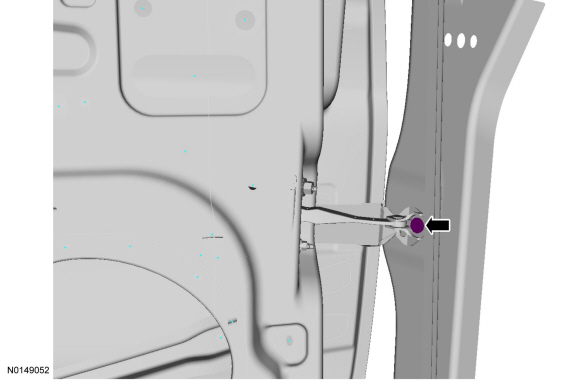
- NOTICE: To minimize the possibility of cross threading, hand
start all fasteners during installation.
NOTICE: To avoid damaging the door, this step requires an assistant.
With a wax pencil, mark the position of each hinge and remove the hinge-to-door bolts.- To install, tighten to 30 Nm (22 lb-ft).
- Remove the front door.
- NOTE: If installing a new door, transfer parts as necessary.
To install, reverse the removal procedure.
- Verify door adjustment. For additional information, refer Door Adjustment - Front or Door Adjustment - Rear in this section.
Luggage Compartment Lid
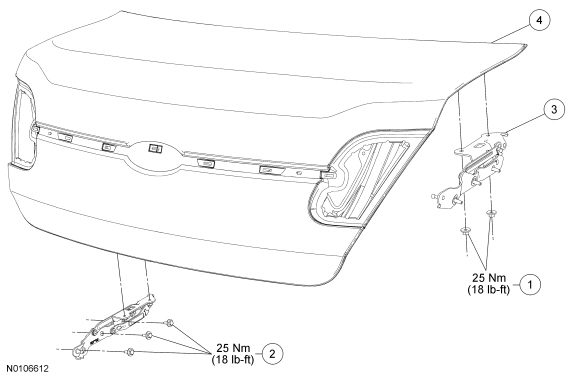
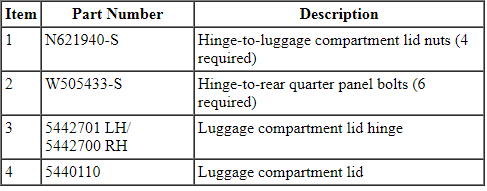
Removal and Installation
- Open the luggage compartment lid.
- Disconnect the electrical connectors.
- With the help of an assistant, remove the hinge-to-luggage compartment
lid nuts.
- To install, tighten to 25 Nm (18 lb-ft).
- With the help of an assistant, remove the luggage compartment lid.
- To install, reverse the removal procedure.
 Front End Body Panels
Front End Body Panels
SPECIFICATIONS
Torque Specifications
DESCRIPTION AND OPERATION
Active Grille Shutter System
Overview
The grille shutter system (when equipped) is comprised of the grille shutter
assembly and the gri ...
 Interior Trim and Ornamentation
Interior Trim and Ornamentation
SPECIFICATIONS
Material
Torque Specifications
DIAGNOSIS AND TESTING
Sunshade
Special Tool(s)
Principles of Operation
Power Sunshade
The power sunshade system consists of the following:
Sunshade s ...
Other materials:
Diagnosis and Testing
Instrumentation, Message Center and Warning Chimes
Special Tool(s)
DTC Chart(s)
Diagnostics in this manual assume a certain skill level and knowledge of
Ford-specific diagnostic practices. REFER to Section 100-00 for information
regarding these diagnostic practices.
DTC Chart - IPC ...
Battery, Mounting and Cables
SPECIFICATIONS
General Specifications
Torque Specifications
DESCRIPTION AND OPERATION
Battery and Cables
Overview
The battery and cable system consists of the following components:
Battery
Battery cable assembly (both negative and positive cable serviced as an
assembly)
High current&nb ...
Fastening the safety belts
The front outboard and rear safety restraints in your vehicle are
combination lap and shoulder belts.
1. Insert the belt tongue into the
proper buckle (the buckle closest to
the direction the tongue is coming
from) until you hear a snap and feel
it latch. Make sure the tongue is
securely fa ...
